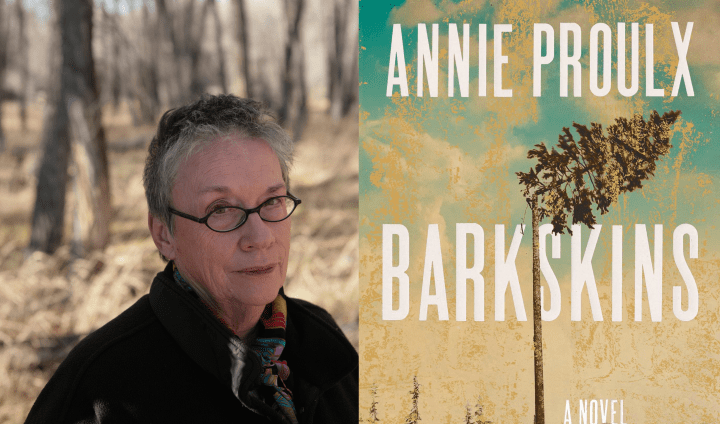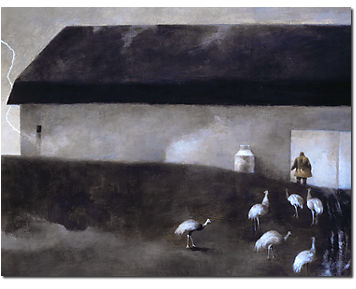
Required Reading: Annie Proulx
June 23, 2016
As part of our Required Reading series, we share a list of three essential works for each of SAL’s featured writers. Up this time: the great American novelist and short story writer, Annie Proulx.
It’s now Thursday, which means it’s too late. If you haven’t already started, you’ll never finish reading Pulitzer Prize-winner Annie Proulx’s new 713-page epic, Barkskins, in time to hear her speak tonight at Temple De Hirsch Sinai in Capitol Hill.
That doesn’t mean you shouldn’t get started. NPR calls it “lovely, dark, and deep.” It’s drawn comparisons to Moby Dick, and, noting its concern with human growth and deforestation, the Washington Post named it “an awesome monument of a book, a spectacular survey of America’s forests dramatized by a cast of well-hewn characters.” Quickly, here’s a cheat sheet so you can show up tonight looking prepared: René Sel and Charles Duquet, two indentured French woodsmen, turn their axes to the seemingly infinite forests of North America. Through the oscillating narrative of three centuries, wealth and destitution shape their descendants, from France, to China, to Maine, and the Pacific Northwest.
In the meantime, here’s what you do have time to read before 7:30 PM sharp. We’ve gathered three of our favorite short stories by Proulx, all available for free online, that demonstrate her masterful grasp of mood and character. In an interview with the Missouri Review, the author once noted:
If the writer is trying to illustrate a particular period or place, a collection of short stories is a good way to take the reader inside a house of windows, each opening onto different but related views—a kind of flip book of place, time and manners.
Whether you’re a long-time fan or new to her works, enjoy these flip books full of folk tales, flights of fancy, and down-on-their-luck cowboys, ranchers, and woodsmen.

1. “The Half-Skinned Steer,” from The Atlantic
Following his brother’s death, eighty-three-year-old Mero drives from Massachusetts to his family’s ranch in Wyoming, which he had left sixty years prior. Based on the Icelandic folktale, “Porgeir’s Bull,” Proulx refashions this ancient story to explore human arrogance, revenge, and memory in the American West in a series of beautifully modulated flashbacks.
He said he would be at the funeral. No point talking about flights and meeting him at the airport, he told her; he didn’t fly, a bad experience years ago with hail, the plane had looked like a waffle iron when it landed. He intended to drive. Of course he knew how far it was.

2. “Rough Deeds,” from The New Yorker
A brief snippet of Barkskins, the short story “Rough Deeds” is centered on the men who tried to capitalize New England’s forests in the beginning of the eighteenth century. In this brutal excerpt, you’ll encounter the log-poaching, thievery, murder, deceit, injury, bribery, and corruption of this early industry.
In New France, which people more and more called Canada, for the old Iroquois word kanata, Duquet was everywhere—examining, prying, measuring, observing, and calculating. Limbs and low-quality hardwood waste became high-quality firewood, and every autumn he packed twenty wagons full for the Kebec market and for Paris, when he could charter available ships with the promise of a good return cargo of tea or coffee or textiles, spices or china. Without the sure promise of a rich return cargo, he thought, let the Parisians freeze.
 3. “Brokeback Mountain,” from The New Yorker
3. “Brokeback Mountain,” from The New Yorker
It’s difficult to overstate the impact that this story, and Ang Lee’s quietly revolutionary film of the same name, had on America’s acknowledgement of homophobia. “Brokeback Mountain” is the bracing, bittersweet story of doomed love between two cowboys who know “in the wrong place we’ll be dead.” Proulx has remarked that this work aimed to dismantle cowboy machismo, what she calls “the great fiction that evolved in the 19th century and lay over the ranching West.”
The shirt seemed heavy until he saw there was another shirt inside it, the sleeves carefully worked down inside Jack’s sleeves. It was his own plaid shirt, lost, he’d thought, long ago in some damn laundry, his dirty shirt, the pocket ripped, buttons missing, stolen by Jack and hidden here inside Jack’s own shirt, the pair like two skins, one inside the other, two in one.
As part of Seattle Arts & Lectures’ 2015/16 SAL Presents series, Annie Proulx is reading and participating in a conversational interview today, Thursday, June 23rd at 7:30. Tickets include a copy of Barkskins. More information and tickets here.